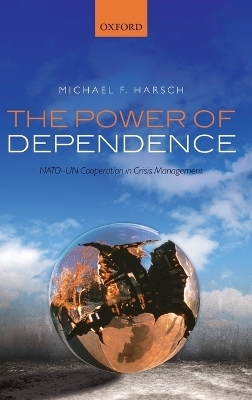
The Power of Dependence
NATO-UN Cooperation in Crisis Management
Seiten
2015
Oxford University Press (Verlag)
978-0-19-872231-1 (ISBN)
Oxford University Press (Verlag)
978-0-19-872231-1 (ISBN)
This work provides scholars and policy makers with a better understanding of the conditions under which international organizations make meaningful efforts to cooperate and offers important insights into inter-organizational partnerships on the international stage.
Since the end of the Cold War, crises from the Balkans to Central Asia and Africa have forced international organizations to adapt, expand, and cooperate to end civil wars, manage humanitarian challenges, and contain terrorist threats. The Power of Dependence explores the complex relationship between two of these organizations: NATO and the United Nations. It advances an innovative resource dependence approach to explain the stark variation in interorganizational cooperation, combining insights from international relations theory and organizational science in a comprehensive theoretical framework. Comparing NATO and the UN's engagement in three major post-Cold War conflicts- Bosnia, Kosovo, and Afghanistan- the study finds that the level and balance of the organizations' resource dependence plays a crucial role in shaping the degree of cooperation.
The Power of Dependence demonstrates the logic, dynamics, and impact of organizational interactions in addressing regional instability and violent conflict. It will be of interest to anyone concerned with understanding and building more effective interorganizational partnerships in crisis management.
Since the end of the Cold War, crises from the Balkans to Central Asia and Africa have forced international organizations to adapt, expand, and cooperate to end civil wars, manage humanitarian challenges, and contain terrorist threats. The Power of Dependence explores the complex relationship between two of these organizations: NATO and the United Nations. It advances an innovative resource dependence approach to explain the stark variation in interorganizational cooperation, combining insights from international relations theory and organizational science in a comprehensive theoretical framework. Comparing NATO and the UN's engagement in three major post-Cold War conflicts- Bosnia, Kosovo, and Afghanistan- the study finds that the level and balance of the organizations' resource dependence plays a crucial role in shaping the degree of cooperation.
The Power of Dependence demonstrates the logic, dynamics, and impact of organizational interactions in addressing regional instability and violent conflict. It will be of interest to anyone concerned with understanding and building more effective interorganizational partnerships in crisis management.
Michael Harsch is a faculty fellow at New York University Abu Dhabi where he teaches courses on international organizations and peacebuilding. He is also a non-resident fellow at New York University's Center on International Cooperation. His research examines international cooperation in promoting security, effective governance and development in fragile and conflict-affected countries, with a focus on Afghanistan and the Balkans.
PART I THEORY DEVELOPMENT; PART II CASE STUDY ANALYSIS: NATO-UN COOPERATION
| Erscheint lt. Verlag | 5.2.2015 |
|---|---|
| Verlagsort | Oxford |
| Sprache | englisch |
| Maße | 163 x 240 mm |
| Gewicht | 516 g |
| Themenwelt | Sozialwissenschaften ► Politik / Verwaltung ► Europäische / Internationale Politik |
| Sozialwissenschaften ► Politik / Verwaltung ► Politische Theorie | |
| Sozialwissenschaften ► Politik / Verwaltung ► Staat / Verwaltung | |
| ISBN-10 | 0-19-872231-1 / 0198722311 |
| ISBN-13 | 978-0-19-872231-1 / 9780198722311 |
| Zustand | Neuware |
| Haben Sie eine Frage zum Produkt? |
Mehr entdecken
aus dem Bereich
aus dem Bereich
Studienbuch
Buch | Hardcover (2023)
De Gruyter Oldenbourg (Verlag)
CHF 62,90
erfolgreiche Interessenvertretung durch Prozesskompetenz im komplexen …
Buch | Hardcover (2023)
Wiley-VCH (Verlag)
CHF 58,75


